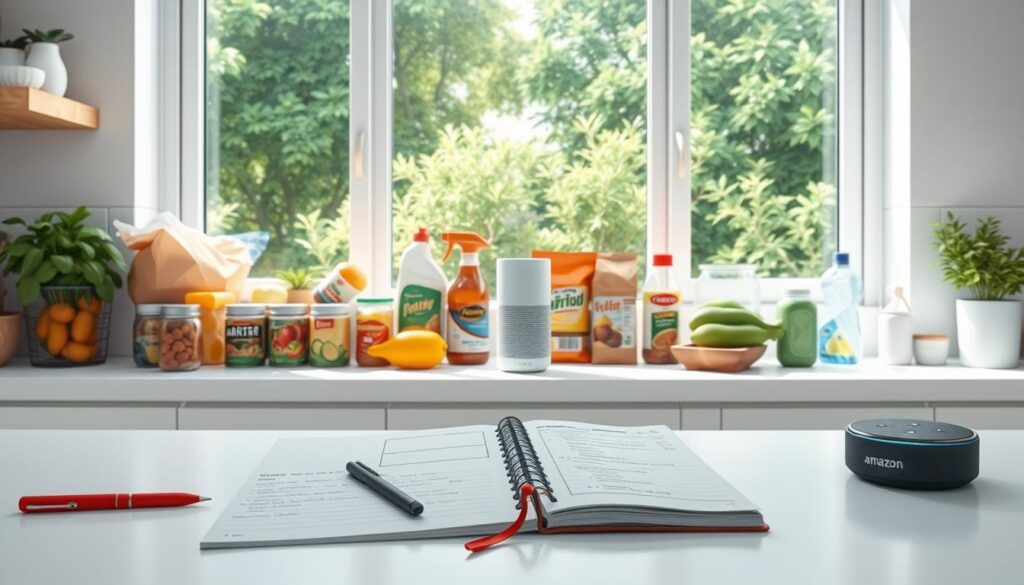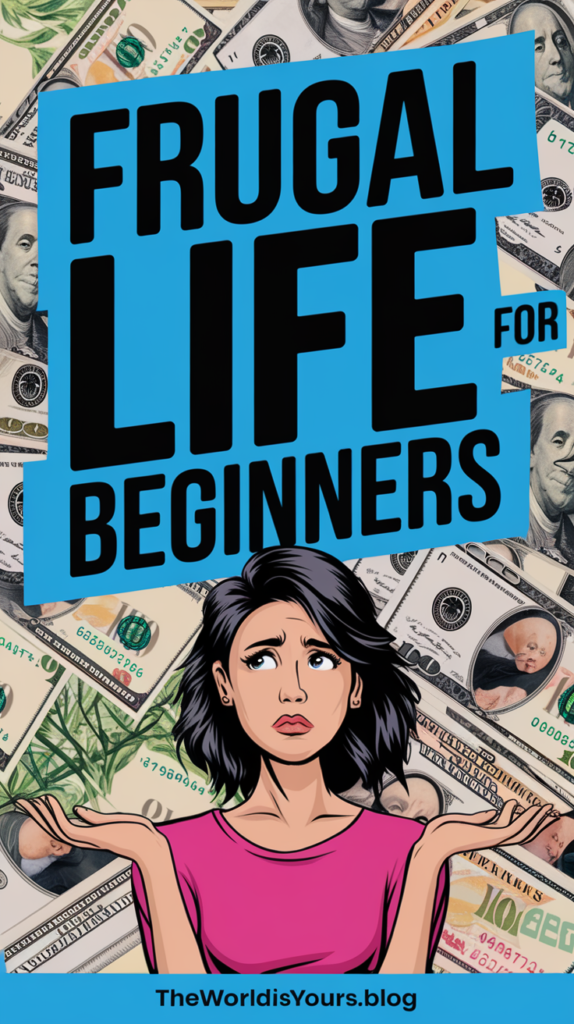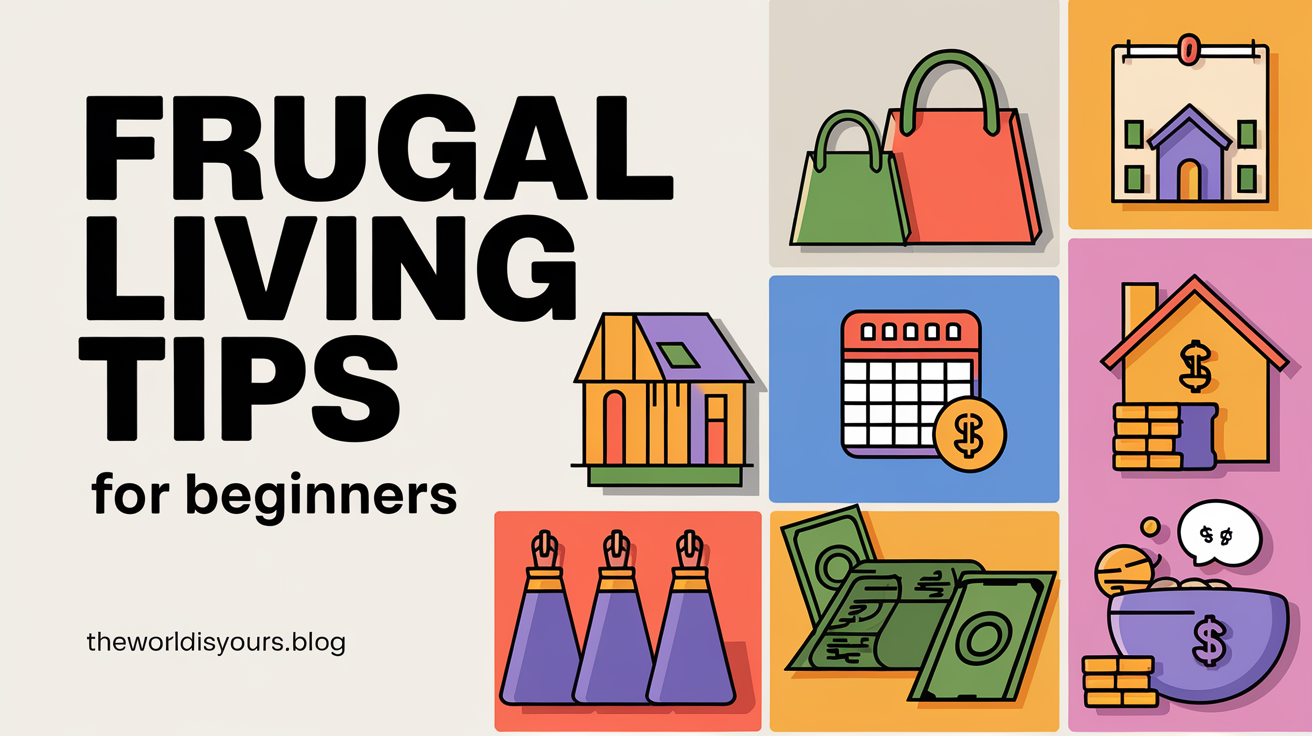Life can be pricey, and many of us look for ways to spend less without giving up fun. With prices going up, it’s key to find ways to save without losing out. Start by saving money with smart budgeting and shopping. Frugal living means making your money go further, and these tips will help you do just that.
These 14 frugal living tips will help you save and reach your financial goals. You’ll learn how to cut down on food and energy bills. Frugal living is not just about saving; it’s also about enjoying life’s moments and what’s truly important.
Key Takeaways
- You can save up to 15%-20% on food costs by adopting a meal planning strategy and reducing takeout food expenses.
- Switching to LED bulbs can save you an estimated $75 over the lifespan of a single bulb, contributing to your energy savings.
- Negotiating bills, such as insurance and internet services, can save you an estimated $100-300 annually.
- Growing your own herbs and vegetables can reduce your grocery bills by an estimated 30% if done regularly.
- Adopting minimalism can lead to a reduction in spending by up to 50%, as it shifts focus from acquiring goods to valuing experiences and essential items.
- Utilizing libraries can save you an average of $100-$300 per year on entertainment costs, depending on the number of borrowed items.
- Participation in ‘no-buy’ or ‘no-spend’ challenges can reveal an average of $100-$300 in unnecessary spending monthly.
Understanding the Foundations of Frugal Living Tips
To reach financial stability, knowing the basics of frugal living is key. This means setting clear financial goals, tracking your spending, and making a budget. Setting goals helps you know what you want to achieve and how to get there. Tracking your expenses is also vital to find ways to save money.
Creating a budget that suits you is crucial. Start by understanding your financial goals and what’s most important to you. This helps you use your money wisely and make smart spending choices. Cutting down on subscription services, cooking at home, and doing DIY repairs can save you a lot. These changes help you reach your financial goals quicker.
- Tracking your expenses to identify areas for improvement
- Creating a budget that allocates 50-30-20: 50% for necessities, 30% for discretionary spending, and 20% for saving and debt repayment
- Implementing the “one-in, one-out” rule for purchases to avoid clutter and unnecessary expenses
By sticking to these tips and keeping a consistent budgeting routine, you can save a lot. This will help you move closer to your financial goals.
1. Start with a Proper Budget Assessment
To start your frugal living journey, you need a good budget assessment. This means finding ways to cut costs and setting up a budget. Meal planning is key here, as it reduces food waste and saves on groceries. By budgeting and tracking your spending, you can find where to cut back and save for more important things.
A budget assessment is crucial for saving money. It helps you see where your money goes and make smart spending choices. A good budgeting system keeps you on track and makes sure you use your money wisely. Ways to save include buying items on sale, comparing prices, and using discounted gift cards.
Frugal living = financial freedom! 📌 Pin this and start your journey today!

- Buy household items on sale to save up to 50% or more
- Compare prices across different sizes and packaging to save approximately 20% on groceries
- Purchase discounted gift cards to save hundreds of dollars during vacation planning
By using these cost-cutting strategies and a budgeting system, you can save a lot. Remember, a good budget assessment is the first step to living frugally. It’s also important to regularly check and adjust your budget to stay on track.
2. Smart Shopping Strategies to Cut Costs
Smart shopping can help you save money. Use coupons, buy in bulk, and shop second-hand. Planning meals and buying in bulk can cut down grocery bills. For example, making bulk breakfasts on weekends can save time and reduce waste.
Some smart shopping strategies include:
- Using coupons and cashback apps to save around 10-15% on your overall grocery bills
- Buying in bulk to reduce per-unit costs by up to 30% compared to retail prices
- Shopping second-hand to save an average of 50-70% on clothing and household items
- Utilizing price comparison tools to find savings between 5-15% on individual purchases
Shopping during seasonal sales can save up to 75% off. These smart strategies can help you save money. You can then use that money for more important things.

Impulse buys can cost 20-50% of your shopping budget. Making a shopping list can help avoid these unnecessary expenses. By adopting these habits, you can make a big difference in your budget and start saving today.
3. Transform Your Food Budget
Changing your food budget can save you money. Cooking at home is cheaper than eating out. The average American spends $11 to $20 per meal when dining out. This can add up fast.
Cooking at home lets you control what you eat and how much. It’s a more affordable choice. Using leftovers is another smart move. It cuts down on waste and saves time.
Think about cooking big batches and freezing meals. This stops you from buying expensive takeout. Planning meals and making a shopping list also helps avoid extra costs. These steps can save you money.

- Using meal stretchers, like cooked lentils or rice, to increase the number of meals served without requiring additional meat
- Utilizing digital coupons to maximize savings on regular purchases
- Keeping a price book to track the lowest prices for items and identify genuine discounts
By using these tips, you can cut down on waste and save on food. Cooking at home and using leftovers are key. They help you manage your budget and reach your financial goals.
4. Minimise Your Household Energy Costs
Reducing household energy costs is key for living frugally. You can do this by using appliances that save energy, turning off lights, and adjusting your thermostat. Using energy-efficient appliances cuts down on energy use and lowers your bills.
Making a few simple changes can help a lot. For example, turning off lights and closing doors saves energy. You might also think about switching to CFL or LED bulbs. They use less energy and last longer than regular bulbs.
Here are some tips to cut down on your energy costs:
- Use energy-efficient appliances to reduce energy consumption
- Turn off lights and shut doors to reduce energy waste
- Adjust thermostat settings to optimise heating and cooling
By making these changes, you can lower your energy costs a lot. Using Energy Star-rated products can save you and your neighbours a lot of money on bills. Also, sealing air leaks and changing your furnace filters often keeps your energy use down.
Small changes, big savings! 📌 Don’t forget to save these money tips!

Every little change helps, and these adjustments can save you money on your energy bills. Being careful with how much energy you use and making a few easy changes can help you save money. It also helps the planet.
5. Master the Art of DIY Maintenance
Learning DIY maintenance can save you a lot of money. You can fix things at home without needing a professional. DIY tutorials are great for learning new skills and saving on repairs.
For example, knowing how to sew on a button or fix a leaky tap can save you a lot. It’s cheaper than buying new or hiring someone to do it for you.
Some benefits of DIY maintenance include:
- Saving up to $1,500 annually by avoiding professional service fees for small projects
- Reducing replacement costs by 30% for common household items, such as leaky faucets and furniture
- Learning new skills through DIY tutorials and online resources
Adopting DIY maintenance habits can save you a lot over time. By doing small repairs yourself, you can avoid expensive professional services. For instance, DIY home repairs can save homeowners $1,500 to $2,000 each year.

To start with DIY maintenance, look for online resources and tutorials. They offer step-by-step guides. Some popular DIY tutorials include:
- Fixing leaky faucets and toilets
- Repairing furniture and appliances
- Performing basic plumbing and electrical tasks
By mastering DIY maintenance, you can save money, learn new skills, and handle your home repairs. So, start looking for DIY tutorials and online resources today. Begin your journey to becoming a DIY maintenance expert.
6. Revolutionise Your Transportation Costs
As you keep going on your frugal living path, looking at your transport costs is key. Driving is expensive, with fuel, insurance, and parking adding up. Using public transport can cut down on these costs. Carpooling and biking also help save money and boost your health.
Here are some ways to change your transport costs:
- Use buses or trains for work or school trips.
- Carpool with friends or colleagues to cut down on cars.
- Walk or bike for short journeys to get some exercise.
Many cities are now investing in bike-sharing and better public transport. This makes it easier to move around without a car. Simple changes in your daily life can greatly lower your transport costs. Plus, it helps the planet.

Ridesharing services are becoming more popular, offering a cheaper alternative to owning a car. These services are moving to electric or hybrid cars, which is better for the environment. Choosing public transport, carpooling, or biking saves money, reduces pollution, and makes you feel better.
7. Create Entertainment on a Budget
Entertainment doesn’t have to cost a lot. There are many ways to have fun without spending too much. Look for free museum days, community events, and game nights to save money. Many places offer free or cheap entertainment, like outdoor concerts and movie nights.
Libraries are also a great place for free fun. They have book clubs, author readings, and even free games and toys. You can also find deals on dining and entertainment through sites like Groupon and Living Social.
- Potluck gatherings with friends, where everyone brings a dish to share
- Game nights at home, where you can play board games or card games
- Outdoor activities like hiking, biking, or camping, which are often free or low-cost
- Free community events, such as farmers’ markets or street festivals
Being creative and looking for affordable fun can help you stay within your budget. Entertainment doesn’t have to be pricey to be enjoyable. With a bit of planning, you can have a great time without spending a lot.
8. Optimise Your Mobile and Internet Expenses
Optimising your mobile and internet expenses is key to living frugally. Start by checking your current subscriptions and cutting out the ones you don’t need. This can save you money each month, which you can then use for more important things.
To lower your mobile costs, talk to your provider about discounts or promotions. You might also consider a prepaid plan or one with less data. For internet, look for the best deals and bundle offers that save you money on both services.
Here are some tips to help you optimise your mobile and internet expenses:
- Review your subscription services and cancel any unnecessary expenses
- Negotiate with your mobile service provider to reduce costs
- Consider a prepaid plan or a plan with a lower data limit
- Shop around for the best deals and promotions on internet services
- Consider bundle deals that can help you save on both internet and TV services
By following these tips, you can cut down on your mobile and internet costs. This will help you reach your financial goals by saving money for more important things.
9. Embrace Second-Hand Shopping
As you keep going on your frugal living path, trying second-hand shopping is a big step. You can find great deals at thrift stores, online, and at garage sales. These places have everything from clothes and furniture to electronics and home goods, all for 50-70% off.
Second-hand shopping saves you money and helps the planet. The second-hand market is expected to hit $64 billion by 2024. This shows more people want to shop sustainably. About 67% of shoppers now prefer second-hand over new items, thanks to environmental worries and wanting to cut down on waste.
- Saving 30-50% compared to buying new items
- Reducing waste and carbon footprint
- Supporting local charities through thrift store purchases
- Discovering unique, one-of-a-kind items
Online and garage sales are also top spots for second-hand finds. Sites like eBay and Facebook Marketplace, along with local groups, make buying used easy. Garage sales and thrift stores add excitement to the hunt, even if it’s just for the savings.
10. Develop Multiple Income Streams
Creating multiple income streams is key to financial stability and security. By having different sources of income, you’re not stuck with just one. This can include starting a side hustle, investing in stocks, or renting out a spare room.
Some popular ways to develop multiple income streams include:
- Freelancing or consulting in a specific area of expertise
- Investing in dividend-paying stocks or real estate investment trusts (REITs)
- Renting out a spare room on platforms like Airbnb
- Creating and selling online products, such as e-books or courses
Having multiple income streams gives you peace of mind. You’re not tied to just one income. It also lets you grow and explore different interests and skills.
By creating multiple income streams, you build a stable financial future. It helps you reach your long-term goals, whether it’s paying off debt, building wealth, or gaining more financial freedom.
11. Build an Emergency Fund Whilst Living Frugally
Creating an emergency fund is key to frugal living. It acts as a safety net for unexpected costs. By saving a bit from each paycheck, you can grow your fund over time. A savings app can help you keep track and stay motivated.
About 40% of Americans can’t handle a $400 surprise without borrowing, the Federal Reserve says. This shows how vital an emergency fund is.
To start, aim to save three to six months’ worth of living costs. Save a part of each paycheck for this. Cutting household spending by 10% to 20% can also help. For instance, you can:
- Use the 50/30/20 rule to split your income for needs, wants, and savings
- Set a savings goal, like saving $50 from a $500 weekly income
- Use cash-back apps to save around $150 a year
Building an emergency fund takes time and patience. Set clear goals and track your spending. This way, you can make a budget that fits your values and goals. A savings app can keep you on track and motivated. With dedication, you’ll have a strong emergency fund and peace of mind.
12. Master the Psychology of Spending Less
As you keep going on your frugal living path, knowing how you spend is key. Impulse buys can quickly increase your spending. The 30-day rule helps you avoid these and makes buying more thoughtful.
Being mindful is also vital. It means staying focused on your money goals, not getting distracted by quick buys. These steps help you build a better relationship with money and reach your financial targets.
Some important tips include:
- Avoiding impulse purchases by using the 30-day rule
- Practicing mindfulness to stay focused on your financial goals
- Using cash-based spending techniques to create a heightened awareness of spending
By understanding the psychology of spending, you can make smarter buying choices. It’s about being aware of your spending and making choices that fit your financial values.
13. Implement Sustainable Frugal Practices
It’s key to use sustainable frugal practices to cut down on waste and save energy. These steps help you spend less on things you can use once and throw away. Start by using containers you already have for leftovers and freezer meals.
Choosing eco-friendly products is another smart move. This includes reusable bags, refillable water bottles, and energy-saving appliances. These choices not only help the planet but also save you money. For example, energy-efficient appliances can cut your yearly bills by $200.
Here are some sustainable frugal practices to think about:
- Reduce waste by reusing and recycling
- Choose eco-friendly products to lessen environmental harm
- Save energy to lower bills and boost efficiency
By adopting these practices, you can help the environment and save money. Every little change you make can add up to make a big difference.
14. Your Journey to Financial Freedom Starts Today
Your journey to financial freedom starts with simple steps. This article has 14 frugal living tips to help you. By following these, you’ll be on your way to financial stability and reaching your goals.
Every small saving counts. With consistency, you’ll take back control of your finances. Start with a budget, cut down on utility costs, or find new ways to earn money.
Each frugal living tip brings you closer to freedom. Stay committed and patient. Your efforts will pay off in the long run.
Now is the time to change your financial future. Start using the frugal living tips from this article. See your savings grow and your debts decrease.
The journey may face challenges, but determination and discipline will open doors. Begin your journey to financial freedom today.
